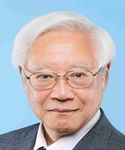| 个人简介 | |
|---|---|
 Prof. Hiroshi Iwai Tokyo Institute of Technology, Japan |
|
| 标题: Development of integrated devices technologies by miniaturization and new materials, and what after? | |
| 摘要: Electronics started in early 1900’s with the invention of vacuum tubes. This was a great technological revolution. Then, the next technological evolution started in early 1970’s by the invention of microelectronics or integrated circuits (IC) composed of huge number of tiny MOSFETs with micrometer size. The performance and cost of the IC per function have unbelievably improved by the continuous miniaturization of the MOSFETs. Now, the microelectronics have evolved to the nanoelectronics and micro-/nano-electronics is the base of smart society for today and near-future, which is characterized by internet, IoT, and AI. In other words, without micro-/nano-electronics technologies, internet, IoT and AI would not exist. However, it is expected that the miniaturization will reach its limit within 10 years, because of several reasons. Then, what about the development of integrated circuits or integrated devices (ID) technologies after the end of miniaturization? Integrated circuits miniaturization technologies for logic and memory will diffuse and diverse to various kinds of devices such as power, photovoltaic, sensor, energy storage etc, in the coming IoT, 5/6G and AI era. In near future, many different kinds of devices will be integrated or connected on-chip, in package, or by wired/wireless networks, and will form integrated devices for smart system suitable for that era. The introduction of new materials will be more active as well as the miniaturization of the various kinds of devices. Then, for a long term for several tens of years, what would be the direction of the integrated devices? We will have to introduce bio systems in combination with the semiconductor devices. Today, AI has made remarkable progress because of the introduction of deep machine-learning as well as the tremendous performance improvement by the semiconductor device miniaturization. However, it is a big problem that AI needs extremely huge power for the leaning of each single application. On the other hand, power/energy consumption of bio system such as brains of human, animals and insects are extremely low, and those brains are extremely efficient. There will a big difference in the hardware between the semiconductor devices and brains, and the semiconductor devices cannot compete with the bio system by several reasons. In this talk, brief history of integrated circuits development with miniaturization and introduction of new materials are explained. Then, integrated devices developments for near and long future will be discussed. | |
| 简介: Hiroshi Iwai received the B.E. and Ph.D. degrees in electrical engineering from the University of Tokyo and worked in the development of integrated circuit devices for 26 years in Toshiba. After early retirement of Toshiba, he joined Tokyo Institute of Technology and engaged in the research of semiconductor device technology for 20 years. He is now a professor emeritus at Tokyo Institute of Technology, a vice dean, Distinguished Chair Professor, and Yushan Professor at National Chiao Tung University, Taiwan. He served many positions in foreign top level universities such as D.J. Gandhi Distinguished Chair Professor, Indian Institute of Technology (IIT) Bombay, India, and Honorary Professor, Chinese Academy of Science, Beijing, China. He has authored and coauthored more than 1,000 international journal and conference papers and 500 domestic (or Japanese) ones. He has served on many committees of conferences and editors of journals, as well as a chair or member of many committees of public organizations. Just for example, he served the President of the IEEE Electron Devices Society, IEEE Division 1 Director, a member of IEEE Board, chair of IEEE EDS Fellow Committee, general chair of IEEE BCTM, general chair of IEEE IWJT, etc. He has contributed to the development of NMOS/CMOS, RF-CMOS, Bipolar, Bi-CMOS, and Power device technologies so many years. Especially, he is well known by this research works for CMOS scaling done for 40 years. He has also developed many products in Toshiba such as high-density SRAM and DRAMS. He received many prizes and awards. Just for example, he received Grand Prize of Nikkei BP Technology Awards, IEEE EDS Paul Rappaport Award, IEEE EDS J.J.Ebers Award, Yamazaki-Teiichi Prize, Prizes for Science and Technology by Minster of Education, IEEE Cledo Brunetti Award, ECS Thomas Callinan award, Nagoya Mayor Award. Dr. Iwai is, a life fellow of IEEE, a fellow of Institute of Electrical Engineers Japan, a fellow of the Japan Society Applied Physics, and a fellow of the Institute of Electronics, Information and Communication Engineers of Japan. | |
